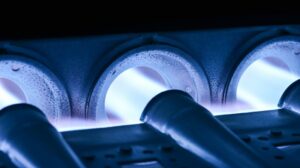Fears about carbon monoxide poisoning and fires can make people feel jittery about having a natural gas furnace in their home—or using natural gas in any capacity. Are these legitimate concerns? Should you worry that your gas furnace can turn into a threat to your family at any moment?
This simple answer is “no.” A gas furnace isn’t a ticking time bomb in your house that’s waiting to go off. The modern gas furnace is built to stringent safety requirements and contains numerous safety features to prevent combustion or toxic gas dangers.
However, this doesn’t mean a gas furnace will always run 100% safely. It’s possible for one to become dangerous, but you can prevent the majority of problems with the right precautions and the assistance of HVAC professionals like us.
Let’s look at how a gas furnace can become hazardous and the ways you can stay safe.
Possible Furnace Safety Concerns
The biggest potential furnace safety issue is a cracked heat exchanger. The heat exchanger collects hot combustion gas and then transfers that heat through the hot metal to the air moving through the furnace and into the ventilation system. If the exchanger develops cracks, it can allow toxic combustion gases like carbon monoxide to leak into the air. This most often occurs in an older furnace when the metal of the exchanger has worn down or corroded.
Other ways that a furnace can become dangerous:
- A blocked flue vent that pushes exhaust gas in the wrong direction
- Flame roll-out, when flames escape from the combustion chamber and enter the rest of the furnace or the area around it
- A build-up of unburned gas in the combustion chamber because of failed burner ignition
- The heat exchanger overheating
Fortunately, for each of these hazards, the furnace has a built-in safety mechanism that will shut the system down if it occurs. The furnace limit switch detects overheating, the flame roll-out switch stops flame roll-out, the draft inducer measures the direction air moves through the flue, etc. If one of these safety features malfunctions, there’s a potential for danger.
Preventing Furnace Hazards
The two best tools you have to keep your furnace running safely are regular heating maintenance and prompt heating repair in Greenville, SC.
Maintenance is a vital service we recommend you schedule each fall. During maintenance, our technicians thoroughly inspect your furnace to look for heat exchanger cracks, test venting, examine gas lines, and check that all safety features are working. Once you’ve had your furnace inspected for the year, you’ll have little need to worry about for the coming winter.
Always schedule furnace repairs as soon as you detect anything abnormal. Even if the problem isn’t yet affecting the heating power of the furnace, it may create safety concerns. We recommend you shut off your furnace and call us right away to see if it needs repairs. Prompt action is the best way to stop bigger problems.
Finally, you must have CO detectors in your house if you use natural gas in any way. These detectors will warn you if there’s a build-up of carbon monoxide so you can leave your house and call for assistance. Please test the detectors every 6 months to ensure they’re working.
Rely on Carolina Climate Control and we’ll say “The Moose Is Loose in Your Neighborhood!”

